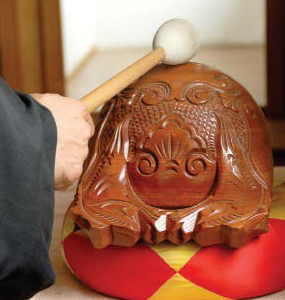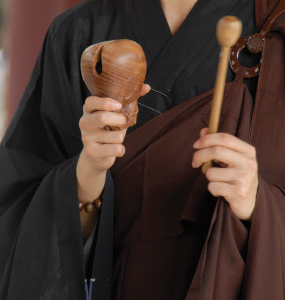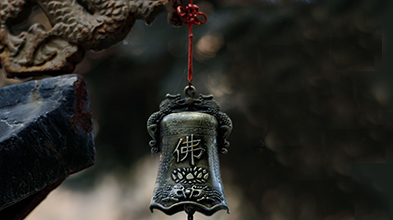I'm treated with the utmost respect every day.
When the monastics use me for chanting, they hold me in front of their hearts. When they are not using me, they carefully place me near the statues of the Buddhas. They act just like I'm the eyes and ears of heavenly beings.
As its name implied, the wooden fish is made out of wood and decorated with fish-shaped carvings. Played as a musical instrument to accompany chant-ing, wooden fish are usually carved out of walnut, camphor, or ebony; its resonance chamber produces a loud, sharp sound when struck that helps to concen-trate the mind.
During chanting sessions the sound of the wooden fish invigorates the listeners with its rhythm, helping the chanters to overcome drowsiness and distraction and enriching the music of the service for the audience. Chanters should strike the wooden fish in accordance with the middle way: neither too fast nor too slow, just as mindfulness should not be too tense nor too lax.
Striking the wooden fish should remind the prac-titioner of the fish’s special talent: whether swimming or remaining still, a fish’s eyes are always open. In the same way, the wooden fish urges us to be diligent and work hard.
Many years ago, I was part of an evergreen tree living in a forest on the very top of a high mountain. One day, a woodcutter hiked up to the top of the mountain, chopped down the tree, and took it to a shop where Buddhist sup-plies were made. There my destiny was in the hands of a wood-carver who changed my life by making me into a “wooden fish.” A few days later, someone clad in what I recognized as a Chinese monastic robe came into the shop and bought me. I don’t know how much he gave for me, but he took me to live in the majestic Great Hall of a temple. A drum, a great gong, and a small hand chime became my best friends.
All year long, I am able to keep myself alert, for I never need a wink of sleep. I’m fashioned to have a strong and cadent voice. They say it’s quite unique―like the sound of the rushing currents of the Yangzi River and the roaring tide of the Pacific Ocean. My percussive timbre—keeping time with the gently rolling, melodic chanting of the monastics—contributes greatly to the sanctity of Dharma services. Whether I am leading a gathering of tens, hun-dreds, or even thousands, everyone follows my tempo. Each time I am struck, voices rise—united and harmonious. Even those outside of the Great Hall who hear my voice become solemn and respect-ful.
One day, a guest who was temporarily living in the temple passed by me. He was talking with another visitor saying, “This morning around five o’clock, through my open window, I heard the sound of a bell, and then I heard the monastics chanting to the beat of the wooden fish. I felt as if carried to a pure land—so peace-ful—as if all human worries had been washed away. I was touched so deeply by this experience that I now appreciate the traditional Dharma instruments more than the modern ones.” When I heard this, I realized how much meaning I brought to the lives of others. I was overcome with a sense of purpose for my life.
Since loving-kindness and compassion are important in Bud-dhism, some people may wonder why during chanting the monas-tics strike something that looks like a fish. Well, it’s for the simple reason that fish never close their eyes. The wooden fish is used as a symbol to remind everybody to stay “awake” and pay attention to their cultivation. I’m treated with the utmost respect every day. When the monastics use me for chanting, they hold me in front of their hearts. When they are not using me, they carefully place me near the statues of the Buddhas. They act just like I’m the “eyes and ears” of heavenly beings. They never hit me purposelessly. I sure enjoy my place in life and hope I’ll always live right here in the Great Hall.
Another time, something quite unexpected occurred. Some students from the National Music Academy in Nanjing who knew Chinese music and had been influenced by Buddhist chanting came to the temple. They were studying Buddhist music. They had tried using modern instruments, but they didn’t like the result. The students were here to ask the abbot about borrowing my friends and me for their music. The musicians were lavish in their praise of Buddhist music—expressing their appreciation for the influence of Buddhist music on the overall development of Chinese music. They specifically praised me for my special contribution as a musi-cal instrument. Boy, when I heard this, I could’ve jumped for joy. I smiled proudly at those modern instruments!
A Chinese proverb goes something like this: “The flower’s bloom is fleeting; dazzling scenes are ephemeral.” This sure is true, for dark days awaited me. It all began when the monastery where I was living at the time wanted to build a dormitory for the mo-nastics but they were just a bit short on funds. One day the abbot came carrying a yellow cloth shoulder bag. He gathered me up and took me into town with him to ask for donations. He started strik-ing me and loudly reciting “NA-MO A-MI-TO FO.”3 In this way, he hoped to receive donations from passersby. But some people didn’t appreciate the abbot’s sincere efforts to promote the Triple Gem in this way. They belittled our efforts, and gruffly dismissed us as being incapable of caring for ourselves without begging for alms. Buddhism was being tarnished by us. As the abbot struck me day after day, the scoffing and ridicule became louder and stronger. People seemed to be losing their respect for me, and I started to question the worth of my life.
Another saying warns that misfortune comes in threes. And sure enough, I was about to be handed number two. It was when we were at another village seeking donations that my poor abbot became ill. He passed away right then and there, leaving me all alone. I didn’t know what to do; I felt just like an orphan. That’s when a raggedy, unscrupulous beggar saw that I was there all by myself, and he grabbed me up. He started going around pretending to be a monk. He would beat on me every day to get people’s at-tention, and then he would beg for food and money. When people didn’t give him any money, he would just get angrier and whack me even harder. My voice became so harsh that people started hating me.
Those who had some knowledge of Buddhism didn’t blame me for being misused by the abbot in that a way. But the average person couldn’t tell the difference between the real monastics and the deceptive beggars. At that time, as more beggars pretended to be monks—by hitting us wooden fish and asking for alms—both monks and beggars came to be equally distrusted. It didn’t matter to me that my own life was in the hands of a beggar, but when I saw the real monastics being disparaged like that, I felt so sorry and ashamed for them.
Later, the beggar who had been abusing me came into some money, and, no doubt, desiring to move on to a new scheme, sold me to a performing troupe. The entertainers were putting on a play at a famous theater in Shanghai. The play was called Eighteen Ar-hats Defeat the Giant Roc Bird. Every single one of the eighteen men who played the roles of the arhats had a wooden fish. In the play, when the giant bird attacked the arhats with its sword-like wings, they used me as a weapon to fend off the bird. I was so afraid! I thought that I was going to die! During that time, who could have known how sad I felt?
I was also forced to be in another play called Shixu Seeks Plea-sure on Green Screen Mountain. I was shamelessly used as the sig-nal that it was safe for a man to have a secret rendezvous with a woman. One day, two monks saw the play. Naturally, they were outraged. Now I ask you, who believes that I would willingly play such a part? One of the monks said with tears streaming down his face, “No wonder Buddhism has declined. We live in sad times with so many people trying to destroy Buddhism. It is most pain-ful to see such a dedicated Dharma instrument being misused. This play caters to the baser instincts of the ordinary townspeople and misrepresents Buddhism. Why aren’t the monasteries here doing something to protect the Dharma instruments from being dese-crated in this way?”
Then there were the Buddhist zealots who saw us wooden fish being used in these strange ways and urged that we all be rounded up and burned! I was pretty nervous when I heard this. I was tired of being mistreated in this world, and I longed to escape from those people and get back to the Great Hall of my monastery. Cutting me into little pieces for firewood was going way too far, because I wasn't the problem. It was those people who were misusing me. That's when I decided to raise my own voice to all the compas-sionate followers of the Buddha pleading, "In order to reform Bud-dhism, please rescue me soon!"
What's New?
NOVEMBER

Humble Table, Wise Fare
INSPIRATION
Recorded by Leann Moore
A moment of loving-kindness:
all things are good;
a moment of anger:
a thousand situations turn evil.

Dharma Instruments
Venerable Master Hsing Yun grants voices to the objects of daily monastic life to tell their stories in this collection of first-person narratives.

Sutras Chanting
The Medicine Buddha SutraMedicine Buddha, the Buddha of healing in Chinese Buddhism, is believed to cure all suffering (both physical and mental) of sentient beings. The Medicine Buddha Sutra is commonly chanted and recited in Buddhist monasteries, and the Medicine Buddha’s twelve great vows are widely praised.

Newsletter
What is happening at Hsingyun.org this month? Send us your email, and we will make sure you never miss a thing!







